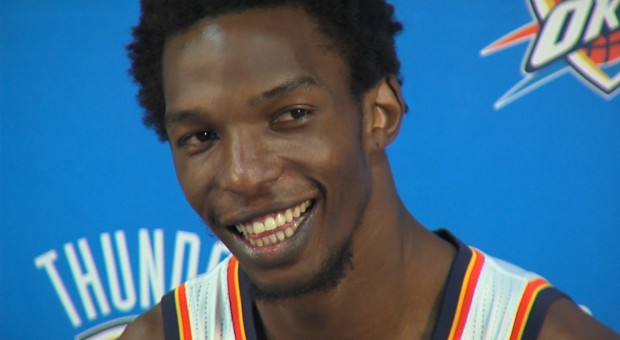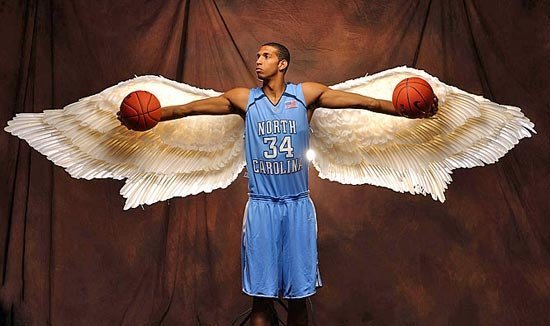Before the NBA season begins, coaches have it all planned out. They know who their starters, at which positions they have depth and which they don’t, and how they are going to manage their rotations. But then the season starts.
Players dip in and out of form, in and out of health. Change is necessary. But some coaches, for a variety of reasons, stick with their starters even after it is long clear that they should be shoved to the bench. Here are 3 guys that should be either starting or way higher on the depth chart.
Hasheem Thabeet – Oklahoma City Thunder

What if I told you that Hasheem “Why the HELL did the Grizzlies pick him 2nd overall” Thabeet was the second best player on the Oklahoma City Thunder? Would you believe me? Cause you should. Cause he is.
Okay, maybe not, but Thabeet is second on the team in both WS/48 and WP/48 (two statistics that attempt to capture the value of a player in a single number), in a significant number of minutes. What is clear is that he is much better than Kendrick Perkins.
And really, it’s not even that close. The per 36 minute numbers above show that, with the exception of assists, fouls and turnovers, Thabeet has been superior to Perkins, yet has received less than half his minutes. It is commonly known that the Thunder’s starting lineup of Westbrook, Seflosha, Durant, Ibaka and Perkins is one of their worst, but that is usually attributed to Seflosha’s lack of offense, or Durant and Westbrook’s inability to coexist. I’d argue that Kendrick Perkins’ presence in the starting lineup is as big, if not bigger, of a reason for the poor lineup.
Jimmy Butler - Chicago Bulls

Luol Deng, who Jimmy Butler backs up, is not having a bad year by any means, just a meh year. Most of his stats are slightly below his career averages: effective field goal percentage and rebounds slightly up, everything else slightly down. He’s the same player he has been every year: maybe a top 10 small forward, but just barely.
And then there is the whole minutes thing. Tom Thibodeau is like a bike with a bum wheel: he’s got no rotation. He runs his starters into the ground, and then tosses a couple minutes at their backups. Deng is playing the most minutes in the league. As the linked article notes, Chicago’s “Bench Mob” is gone and Thibodeau doesn’t trust the new bench. For all Thibodeau’s defensive wizardry, his ability to recognize talent is suspect, as both Taj Gibson and Jimmy Butler could start for most teams in the NBA. But this is about Butler.
Jimmy Butler does one thing, and one thing very well: he puts the spherical object through the round one. His true shooting percentage is tops in the Bulls because he is okay at shooting, but he is elite at getting to the line, where he hits 90% of the free throws. Given that the Bulls have the 20th best offense in the league, and 26th best effective field goal percentage, they can use all the Butler they can get.
Brandan Wright - Dallas Mavericks

I’d call Wright a power forward, ESPN has him as a center, but either way, with Dirk out Wright is the Mavericks best big man and needs to be playing a lot more. The funny thing is, Wright has been an average or above average player practically his entire career, including last year when he absolutely killed it…for the Dallas Mavericks! Between this and the Mavericks recent signing and apparent intention to start Derek Fisher, the shiny Mavericks analytics team has certainly lost some of their luster.
Now, at first glance, the above numbers would seem to suggest that Elton Brand has in fact been the Mavericks best big man. If these three were point guards that might be the case, but they’re not, they’re power forward/centers. Their main jobs are to score, rebound, and defend. Anything else is just gravy.
At scoring, Brandan Wright has been, and continues to be, elite. He only takes really good shots, makes a lot of them, and shoots his free throws well. In contrast, Elton Brand has been downright awful at shooting this year. Brand is the 335th best shooter in the entire league, and big men almost always have higher field goal percentages than guard! His shooting has been so bad that it absolutely destroys any other value that he may offer.
Brand is better than Wright at rebounding, while they are both much better than Kaman. Wright is actually a better defensive rebounder than Brand, while Brand cleans up on the offensive glass, which very well could be a result of how godawful terrible Brand has been shooting the ball.
On defense all three have been pretty close. Brand has a 103 D Rating (lower is better), Wright a 105, and Kaman a 106. By O Rating, however, Wright has a 123 (higher is better), Kaman a 102 and Brand an abysmal 97. The Mavericks overall D Rating is 106.5, and O Rating is 104.1. Wright has therefore slightly helped the D, while being a massive boon to the offense. Kaman has been a bit below average on both, and while Elton has played the best big man defense, his aforementioned terrible shooting makes him a complete offensive liability.



First, I couldn’t agree more on Butler and Wright. Great picks.
However I don’t agree on Thabeet. His per 36 looks better because he’s put up those numbers against bad teams in garbage time. If you look at his per 36 in close games (final score differential less than 10 points) it looks a lot more pedestrian:
7 games, 80% FG (5 shots), 77% FT, 9.0pts, 8.4rebs, 0 ast, 1.8 blks, 2.4 stls, 7.8 fouls, 3.6 turnovers.
Thabeet has a lot of fouls and turnovers for a supporting player. He hasn’t earned more minutes when it counts yet.
To follow up on this, I think this is always a pretty good topic and you make a good case for all three. But I think the topic and Brian’s comment also raise the question of how much performance relates to minutes.
I would actually expect that most players improve their performance with increased playing time: more experience, more time to adjust to the speed of the game, more opportunity to become comfortable. However, I suspect there are some (and Thabeet seems like a good example) who benefit from small sample sizes - both in data that is likely inflated by weaker competition or meaningless circumstances, or from very small successes having a disproportionately large impact on their overall stats.
Thabeet’s played under 200 minutes. Wrights’ has played 209. When James Harden was still under 200 minutes this year, he was statistically Michael Jordan in his prime. We’ve since seen that is, to no one’s surprise, not actually true. At 14-15 games, I think you start to get a meaningful sample size for some players. But perhaps not those who play 12 minutes per game.
I certainly agree with some of these criticisms of Thabeet. Obviously, when you are talking about a back-up 14 games into the season, the sample size is incredibly low, coloring any and all conclusions. That can’t be avoided.
Additionally, Thabeet’s foul and turnover numbers are worrying; dude fouls A LOT, and if he were to get increased minutes he would certainly have to cut that down.
Brian, I wholeheartedly disagree that about Thabeet playing against “bad teams in garbage time”. I would counter that, if you accept that is true, it would almost make Thabeet’s performance MORE impressive. Perkins gets to play the majority of his minutes as the distant, distant FIFTH option behind Durant, Westbrook, Ibaka, and Sefolosha, and he’s terrible on offense. Seriously, Sefolosha has a higher usage rate than Perkins. Teams don’t even guard him, whereas Thabeet has to play his minutes with Kevin Martin, Eric Maynor, Nick Collison and…DeAndre Liggins?
Kendrick Perkins is also a bad enough free throw shooter that he can become a liability in close games down the stretch, while Thabeet is pretty good.
Hans, you bring up an interesting question that I have always wondered about in the Jeremy Lin debate. Lin put up great numbers playing 37 minutes a game for 20 games, and a lot of people discounted it, saying they needed to see him do that over a full season. But then we have players who play a solid 12-15 minutes a night the entire season, but people discount them, saying they need to see them do it with increased minutes. At some point, to find out whether something is a result of genuine improvement or simply small sample size theater, they have to be given increased minutes.
I’m not sure that Thabeet will be way better than Perkins with increased minutes, but I certainly think he’s played well enough to deserve the opportunity.